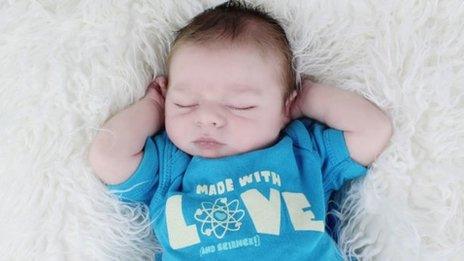Baby born using new IVF screening technique
- Published

A baby has been born in the US using a new method for screening embryos during IVF which could dramatically reduce costs, researchers report.
Connor Levy was born in May after the test, devised at Oxford University, helped doctors pick an embryo with the best chance of success.
Only one in three attempts at IVF results in a baby as abnormalities in an embryo's DNA are common.
Large trials are now needed to see how effective the method is, experts say.
If there are abnormalities with the packages of DNA, called chromosomes, in the embryo then it will not implant in the womb or if it does the foetus will not reach term.
It is a problem which increases rapidly with age. One quarter of embryos are abnormal in a woman's early 30s, but this soars to three quarters by the time a woman reaches her late 30s and early 40s.
Some clinics already offer a form of chromosome screening, but it can add between £2,000 and £3,000 to the cost of IVF in the UK. Connor's mother, Marybeth Scheidts, said it would have cost her $6,000 (£4,100) for the test in Pennsylvania.
The new test takes advantage of the dramatic advances in sequencing the human genome. Within 24 hours it can ensure the correct number of chromosomes are present.
Dr Dagan Wells from Oxford University told the BBC: "Current tests are adding a significant amount of money on to an already expensive procedure and that is limiting access; most patients are having to pay for this out of pocket themselves.
"What our technique does is it gives you the number of chromosomes and other biological information about the embryo at a low cost - probably about two thirds of the price of existing methods of screening."
He says trials are now needed to see if it could improve IVF success rates.
Tears of joy
The baby and a further pregnancy resulting from the screening method will be announced at the European Society of Human Reproduction and Embryology conference.
Marybeth Scheidts, 36, and her husband David Levy, 41, had been trying to conceive naturally for four years and also tried artificial insemination.
In the screening three of the 13 embryos produced were healthy. Without chromosome screening, picking the right embryo would have been down to luck. Instead they were successful on their first attempt.
Marybeth told BBC News Online that the years of trying were tough: "It takes its toll, there were some days I would break down and cry, I wanted to hide in my bedroom and say stop.
"Then to see him... all this hard work and we have finally got our little tiny human being named Connor."
Dr Michael Glassner, the fertility doctor at Main Line Health System where the IVF took place, said such techniques would become more common.
"If you have ever sat across the desk from a patient that has failed or is in that crossroads of thinking of another cycle and you look in their eyes where they are barely able to hold on to their hopes and dreams - anything that is so significantly going to impact pregnancy rates is going to become standard.
"So I think five years from now you fast forward - yes I think it will be standard."
Commenting on the study, Stuart Lavery, a consultant gynaecologist and director of IVF at Hammersmith Hospital, said: "This is amazing science.
"They done the work in humans, they've pregnancies - so it's a pretty powerful proof of concept study using an exciting technique."
He also praised the researchers for saying proper trials needed to be conducted before it was used widely.
- Published8 July 2013
- Published2 July 2012
- Published18 June 2013
- Published28 June 2013